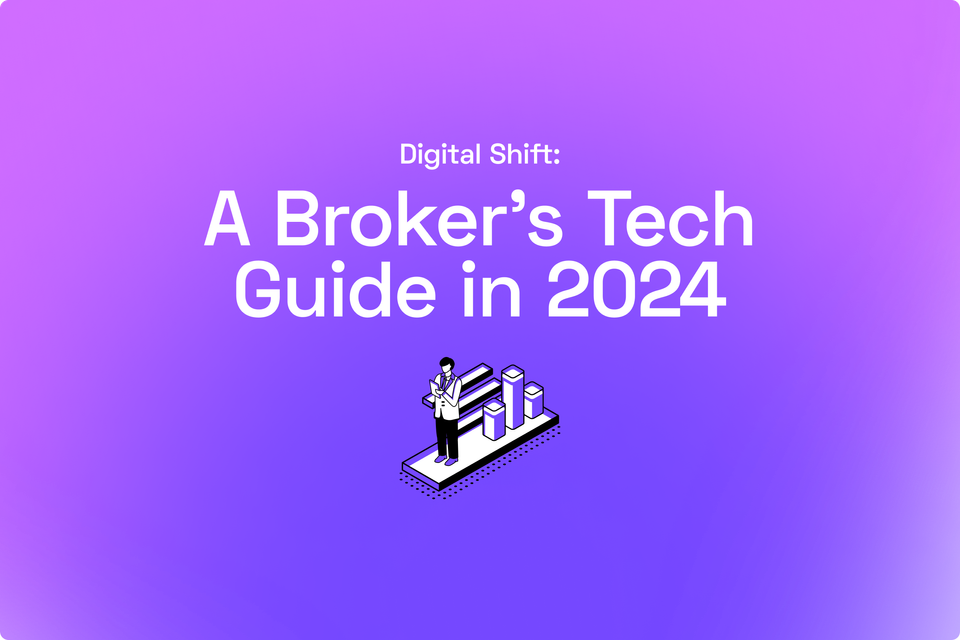Digital Shift: Broker's Tech Guide in 2024

The landscape of the insurance sector is rapidly evolving as technological advancements continue to shape the industry. As we look ahead to 2024, it's clear that brokers who are unable to adapt to these digital shifts will be left behind. In order to compete in this changing landscape, insurance brokers must embrace the use of cutting-edge technology and digital tools that are designed to streamline processes, increase efficiency and improve the client experience.
From car insurance software to other creative solutions, brokers must have a strong technological foundation to set themselves apart from the competition. By keeping up with the latest technological advancements in the industry, brokers can position themselves as leaders in insurance tech and be well-poised to drive industry innovation forward.
Section 1: The Rise of AI and Machine Learning

The advent of AI and machine learning has brought about a profound transformation in the car insurance industry. Insurance brokers are increasingly relying on digital tools powered by AI to underwrite and assess risk more accurately. Thanks to the development of more sophisticated algorithms, insurers can now leverage vast amounts of data to create personalized risk profiles for individual customers. As we look ahead to the future of car insurance, it's clear that AI-driven customer service tools like chatbots will play an increasingly important role in the industry.
By deploying these intelligent systems, insurers can provide round-the-clock assistance to policyholders, helping them navigate complex claims processes and obtain prompt settlements. By 2024, it's likely that car insurance software will be fully integrated with AI-powered underwriting and customer service tools, creating a more efficient and responsive industry that can better serve the needs of its customers.
Section 2: Big Data and Analytics in Insurance
In today's insurance market, the use of big data and analytics is becoming increasingly important. With the rise of insurance broker technology and digital tools for brokers, companies are starting to take advantage of the information available to them in order to personalize insurance policies for clients.
By analyzing data regarding customers' driving habits, for example, car insurance software can create policies that cater to individual needs and circumstances. Through the use of market analysis via analytics, insurers can gain insight into the needs and preferences of their customers, ultimately creating policies which resonate with their audience. By using big data and analytics in this way, the industry is set up for success in the future. In fact, the projected 2024 insurance tech market is estimated to reach a revenue of 16.8 billion dollars, showing the importance of utilizing these technologies in today's world.
LUNA, a service-tech insurance brokerage, revolutionizes the industry with big data. Their innovative app and expert services streamline the insurance process for customers and brokers. LUNA's digital tools offer a seamless experience with 2-minute quotes, 24/7 agent availability, hassle-free insurer transitions, and real-time tracking. By utilizing big data, LUNA ensures fair pricing and proper coverage for clients.
Our car insurance software has saved users an average of $597 per year. With privacy protection, pre-renewal automatic shopping, and digital insurance cards, LUNA provides transparency and convenience. By combining technology, expertise, and personalized service, LUNA transforms the insurance experience.
Section 3: The Impact of Blockchain on Car Insurance Transactions

As the insurance industry faces increasing demands for transparency and efficiency, brokers and insurers alike are turning to technology to streamline their workflows and improve customer experiences. The integration of blockchain technology into car insurance transactions has the potential to transform the way claims are processed and fraud is detected.
By creating secure, decentralized networks that enable information exchange and verification without the need for intermediaries, blockchain technology can significantly reduce costs for brokers and insurers, while also enhancing customer satisfaction. As the insurance industry races toward a 2024 technology-driven future, car insurance software equipped with blockchain technology will likely become a must-have for agents looking to stay ahead of the curve. While adoption may still be relatively low, those who embrace these digital tools for brokers now will be well-positioned to succeed in the years to come.
Section 4: Mobile Platforms and Apps for Brokers
Insurance broker technology has come a long way since the early days of relying heavily on manual processes. With the rise of digital tools for brokers, it’s now possible for brokers to seamlessly manage their client base with the help of advanced features that cater to their specific needs. The insurance tech industry is projected to grow rapidly as we approach 2024, and it’s easy to see why: mobile platforms and apps for brokers offer unparalleled convenience and accessibility.
One particularly powerful category of apps is car insurance software, which streamlines the process of quoting and issuing policies. But the benefits of mobile apps for brokers don’t stop at policy management. With features like real-time alerts, customized reporting, and dynamic onboarding, the right app can help brokers build stronger relationships with their clients while reducing administrative inefficiencies. Successful brokers in today’s digital age must stay up-to-date with these emerging technologies to remain competitive and better assist their clients in managing their insurance needs.
As we move further into the world of insurance broker technology, digital tools for brokers are becoming more essential to the industry's success. In particular, mobile platforms and apps for brokers are incredibly useful for connecting with potential clients and managing policies efficiently.
Looking ahead to 2024 insurance tech trends, it's clear that brokers who want to stay ahead of the curve need to invest in reliable and user-friendly mobile apps. That's where LUNA's platform comes in. By providing brokers with an intuitive and customizable app, LUNA is helping them connect with clients seamlessly, track policy performance, and manage claims easily. LUNA's app is a key tool for any broker looking to thrive in the modern insurance marketplace, particularly for car insurance software.
Section 5: Telematics and Usage-Based Insurance Models

A technological revolution has taken over the insurance industry, and one of the most notable developments is the integration of telematics in car insurance policies. Telematics refers to the use of digital tools and technologies to collect and transmit data about an insured vehicle's usage patterns.
This data, in turn, allows insurers to offer personalized insurance policies based on the driver's behavior. The rise of telematics in car insurance is attributed to the increasing need for insurance companies to offer more competitive and flexible policies that cater to the needs of modern drivers. The benefits of telematics-based insurance models are two-fold; they offer significant advantages to both clients and brokers. Clients can enjoy personalized policies and lower premiums, while brokers can harness car insurance software to analyze and interpret data to provide better advice and recommendations.
With the ever-changing technological landscape, expected insurance tech trends in 2024 suggest that telematics will continue to evolve, shaping the future of insurance policies. In summary, the rise of telematics in car insurance has created an opportunity for insurance brokers to leverage technology, drive innovation, and offer personalized policies tailored to their clients' needs.
Section 6: Cloud Computing and Data Security
Cloud computing has become an ever-increasingly important aspect of data storage and management. As insurance brokers rely more on technology to facilitate communication between customers, insurance companies, and other intermediaries, the volumes of data they handle continue to grow at a staggering rate. Digital tools for brokers are creating a world where traditional business models are being displaced, and the importance of cloud computing for safe and accessible data storage has never been greater.
Trillions of data points are expected to be generated by 2024 insurance technology, requiring vast amounts of computational and storage resources. With the increasingly sensitive personal data being held by insurance companies and brokers, data security is a critical and complex aspect of any data-driven business. Cybersecurity is not only crucial for business continuity but also for the ethical obligations that brokers owe their clients.
Therefore, it is imperative that data security protections and measures are included as part of any cloud computing or car insurance software strategy to combat potential cyber threats effectively. This is the digital age, and the stakes are too high. Thus, insurance brokers cannot afford to be complacent when it comes to data security. Of paramount importance is a commitment to the use of the latest cyber threats tools for data protection to ensure that confidentiality, availability, and integrity of your data are always guaranteed.
Section 7: Integrating Digital Tools into Broker Operations

In recent years, the insurance industry has seen a significant shift towards digitizing and automating traditional processes. Insurance broker technology has seen a major overhaul in the form of digital tools for brokers that are designed to streamline and automate various aspects of their operations. According to a study, the global insurance tech or insurtech market is expected to reach $24.84 billion by 2024 as more businesses invest in these digital tools.
The integration of digital tools into brokerage operations allows brokers to work more efficiently, accurately, and quickly. However, this transition also comes with challenges. It is crucial for brokers to have digital literacy to effectively navigate and utilize these tools. Investing in the necessary training and resources to enhance staff's understanding of the car insurance software and other digital tools is essential for successful integration. Ultimately, the successful adaptation of digital tools in brokerage operations can boost productivity, improve customer service, and enable brokers to stay ahead of the curve in a highly competitive industry.
Section 8: Future Tech Trends and Innovations
The future of technology in the insurance brokerage industry is bound to have a profound impact on the way brokers interact with their clients. As the shift towards digitization continues, having access to digital tools and technology will become increasingly important in order to streamline processes and provide a better customer experience. In the coming years, we can expect a surge in insurance tech innovation, with predictions placing an estimated 150 billion dollars in the industry by 2024. Brokers who can adapt to these changes and stay ahead of the curve will be better positioned to thrive in the industry.
One particular area of interest for brokers is the development of car insurance software. With the growing popularity of usage-based insurance programs and other telematics-based products, brokers need to be equipped with the right software to efficiently and effectively manage these programs. The software must be responsive, customizable, and integrate seamlessly with other digital tools. It's not just about having the right technology, though; it's about understanding how to use it to build strong relationships with clients. For example, brokers can use software to analyze customers' driving behavior and offer targeted discounts or customized insurance plans.
As technology continues to shape the future of the insurance brokerage industry, brokers need to remain nimble and adaptable. Educating teams about new developments, building technology strategies, and staying up to date with emerging trends in the market are all key components of preparing for future growth and success. What sets the most successful brokers apart from their competitors is their ability to take a proactive and strategic approach towards leveraging technology to drive value for their clients. By actively embracing and adapting to the inevitable changes in the industry, brokers can ensure they remain relevant and competitive in the years to come.
Section 9: How LUNA Can Help

LUNA Insurance, a service-tech first insurance brokerage, is dedicated to transforming the insurance industry with its innovative approach to technology for brokers and customers. As the world of insurance continues to revolve around cutting-edge technology, LUNA's digital tools for brokers, including rate comparison and client acquisition features, make it easier for brokers to stand out in the competitive digital landscape.
Moreover, customers love LUNA because of its efficient, convenient and hassle-free approach to insurance. By offering insurance quotes in a record 2 minutes, LUNA's app saves users an average of $597/year on auto insurance and simplifies the entire switch between insurers. The app is also popular for its round-the-clock access to licensed professionals, who are always available to provide policy assistance and answer insurance questions. With extensive privacy protection, automatic pre-renewal shopping, and 24/7 agent availability, LUNA is changing the way insurance works.
The insurance brokerage industry has witnessed a paradigm shift in recent years, thanks to the emergence of digital transformation. Technological advancements such as AI and machine learning, big data and analytics, and blockchain have disrupted traditional insurance processes, making them faster, more efficient, and cost-effective. To stay competitive, brokers must continuously educate themselves on the latest technology trends and utilize digital platforms such as LUNA to streamline operations. Mobile apps and telematics are no longer just value additions, but essenstial tools in the broker's arsenal. Data security is paramount, and cloud computing has come to the aid of brokers who need to access information on-the-go. By embracing digital transformation, insurance brokers can increase customer satisfaction, reduce costs and boost productivity. And with 2024 expected to witness a plethora of new insurance tech innovations, there has never been a better time to dive into car insurance software.
